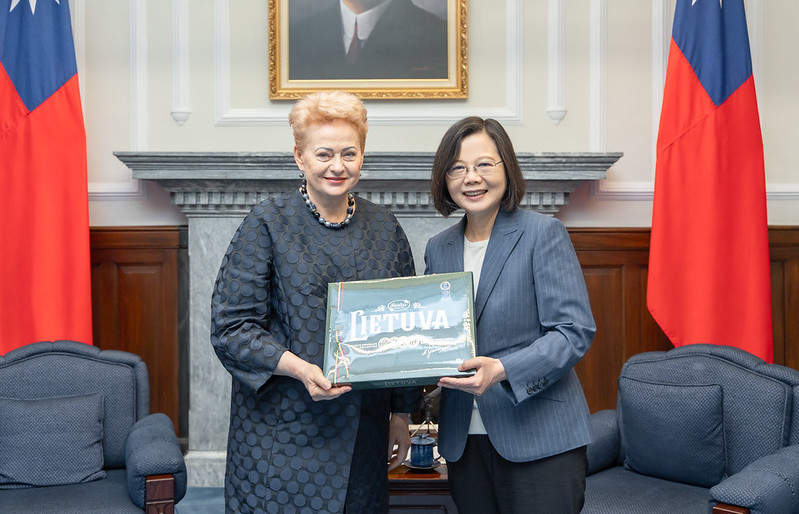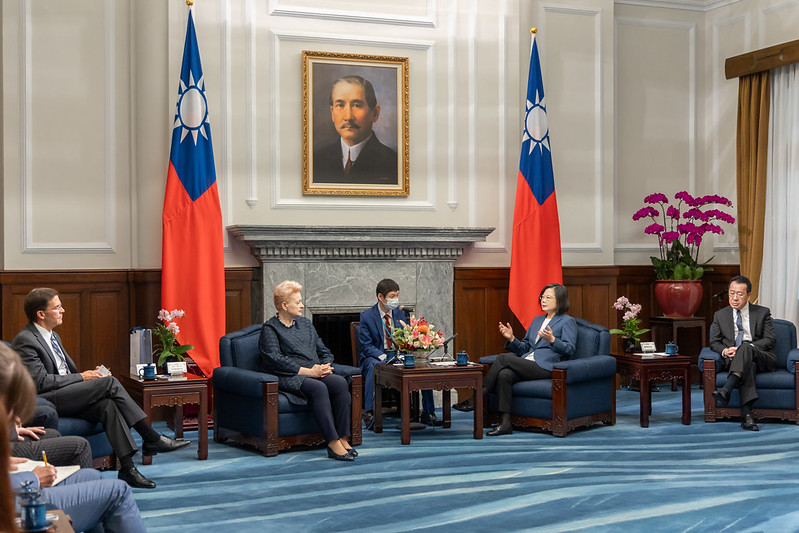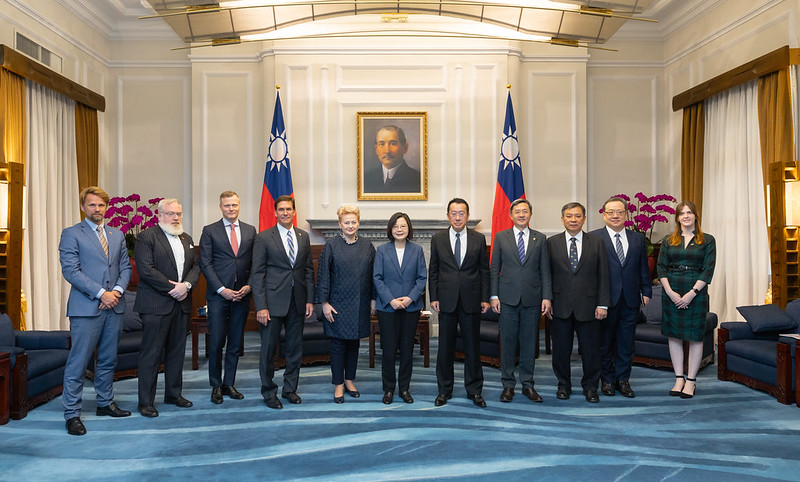News & activities
 News releases
News releases
On the morning of August 24, President Tsai Ing-wen met with a senior delegation from the Atlantic Council, a think tank based in Washington, DC. In remarks, President Tsai said that in the face of current global challenges, strengthening democratic resilience has become an issue of shared focus for the international community, and that investment and cooperation in economic affairs and trade, as well as stable and resilient supply chains, are critical for democracies. The president pointed out that in recent years, economic and trade relations between Taiwan, the United States, and Europe have grown closer, and that this not only helps strengthen Taiwan's economic autonomy but also aligns with the common interests of the US and Europe. She emphasized that Taiwan will continue to expand our cooperation with like-minded countries and together maintain a free, open, and prosperous Indo-Pacific region.
A translation of President Tsai's remarks follows:
Welcome to the Presidential Office. Last summer, I also received a delegation from the Atlantic Council led by former US Secretary of Defense Mark Esper, who is with the delegation today. I would like to begin by thanking all of you for your concrete demonstration of the US and Europe's transatlantic support for Taiwan.
Recently, athletes from countries including Lithuania and Latvia were in Taiwan to play in FIBA Basketball World Cup preparation games, which ended the day before yesterday. On the last day of the games, former President Dalia Grybauskaitė of Lithuania and I watched a match together, which was very exciting. Aside from sports exchanges, interactions between Taiwan and Lithuania have grown closer across many fields in recent years. We have established representative offices in each other's countries and undertaken mutual visits, and are seeking more opportunities for cross-sector cooperation.
Over the past three years, the world has faced global challenges such as the COVID-19 pandemic and the Russian invasion of Ukraine. Strengthening democratic resilience has become an issue of shared focus for the international community. This has also highlighted the importance of collaboration among democracies. In particular, Taiwan, Lithuania, and the Czech Republic share in their histories the experience of striving for democracy and freedom. Today, we are on the frontline of the defense of democracy and freedom, and we stand together with democratic countries in facing the threat and expansion of authoritarianism.
In facing authoritarianism, investment and cooperation in economic affairs and trade, as well as stable and resilient supply chains, are critical for democracies. In recent years, economic and trade relations between Taiwan, the US, and Europe have grown closer. This not only helps strengthen Taiwan's economic autonomy but also aligns with the common interests of the US and Europe.
The signing of the first agreement under the Taiwan-US Initiative on 21st-Century Trade has further tightened our bilateral economic and trade partnership. Going forward, we will continue to push for the signing of an avoidance of double taxation agreement, which will create a more attractive investment environment for both Taiwan and the US.
As for cooperation between Taiwan and European countries, last year we announced the Taiwan-Europe Connectivity Initiative. Taiwan also established investment and credit funds for Central and Eastern Europe. Our goal is to reinforce ties in strategic industries such as biotechnology and electric vehicles.
We will continue to expand our cooperation with like-minded countries and together maintain a free, open, and prosperous Indo-Pacific region.
In closing, I thank our friends from the US and Europe for repeatedly underlining the importance of peace and stability across the Taiwan Strait at numerous international venues. Our meeting today is a display to the international community of democratic solidarity. I wish you a productive trip.
Former President Grybauskaitė then delivered remarks, thanking President Tsai for meeting with them and saying that it is a great opportunity not only to visit and have serious discussion with the government, non-governmental institutions, and think tanks, but also to learn and to share their experiences.
Former President Grybauskaitė said that Lithuania is a new friend in this region and that our friendship and our experience in history are similar, as we are both small but proud countries, with large and not always friendly neighbors.
Former President Grybauskaitė noted how large powers who are not very confident try to suppress or intimidate smaller powers, and said that for smaller countries such as Taiwan and Lithuania, that gives us the strength to protect our peoples.
Former President Grybauskaitė said that she is very thankful for this chance to visit and learn how fast Taiwan is developing. She pointed out that only a few decades ago Taiwan came out of martial law to become a democracy and protected its democracy, something which is not so simple. She said she believes that a country's performance is not about the size of the country, but the real power of the country. Everything depends on our people, she added, and if our people want democracy, if they want to be independent, if they want to be free, they will be free. She then expressed her hope that Taiwan's people create their country in the way they would like to, with nobody dictating how to do it.
The delegation also included Vice President and Director of the Atlantic Council's Scowcroft Center for Strategy and Security Matthew Kroenig, Director of the Atlantic Council's Indo-Pacific Security Initiative Markus Garlauskas, and Visiting Fellow of the Atlantic Council's Europe Center Petr Tůma.












